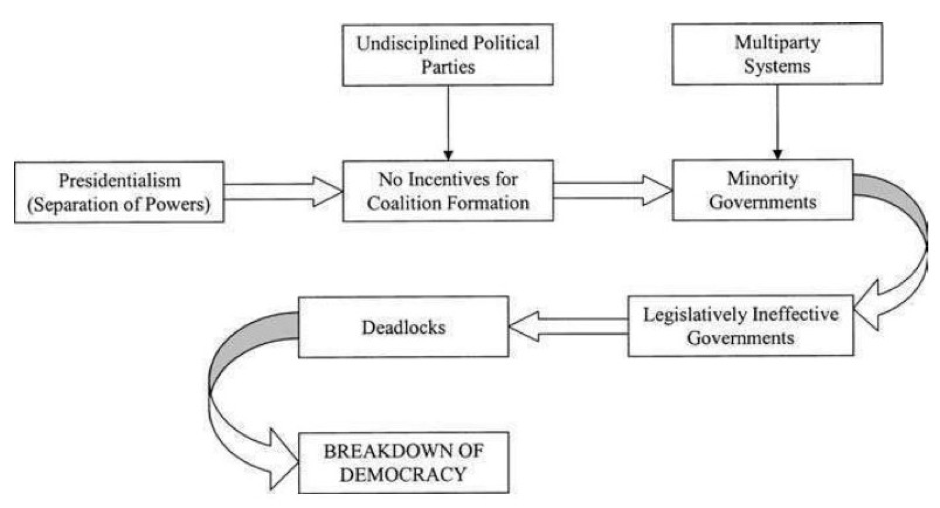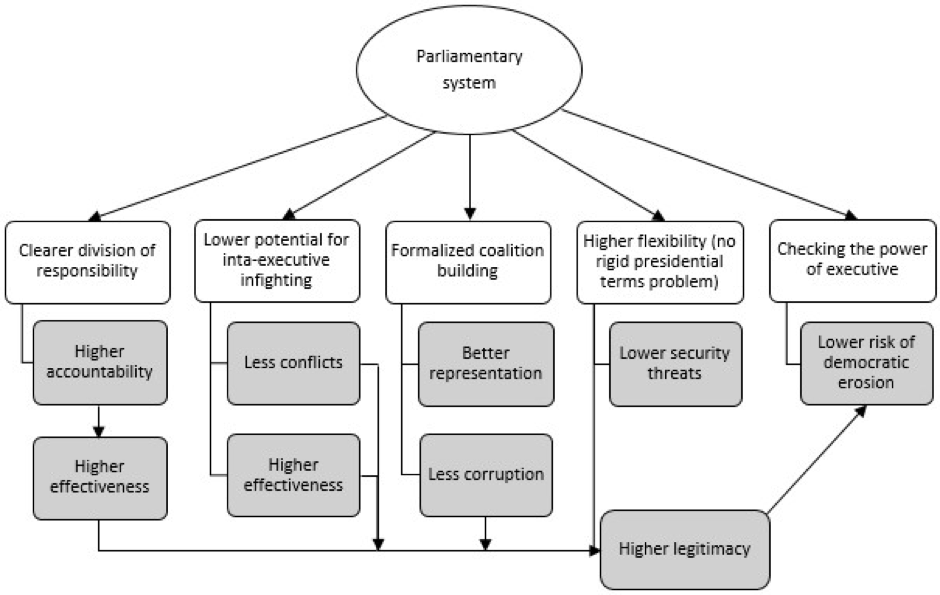It follows from the comparative politics literature that the choice of political institutions may have lasting effects on the development of Ukraine. Though it seems that no system of government is unambiguously better, a shift to parliamentarianism could make Ukrainian political system more accountable and more efficient as well as less conflictual, less corrupt and less prone to the erosion of democracy.
A recent publication on VoxUkraine went well beyond the ongoing political events in Ukraine by revealing the underlying reasons for the political crisis and calling for a clearer division of responsibility between the president, the government and the parliament. Relative desirability of presidentialism and parliamentarianism has long been a key question in political science. In this article, I briefly review relevant studies and discuss five reasons to believe that a more parliamentarian system, as opposed to presidential or semi-presidential systems with significant presidential powers [1], may be more beneficial for Ukraine. I hope that this essay can contribute to an objective discussion of the issue, given that constitutional changes in Ukraine have often been a way of gaining upper hand over political opponents rather than an attempt to overcome the challenges facing the country.
Academic debate: systems of government and democracy
Political scientists have mostly considered various systems of government in light of their effect on the sustainability of democracy. For a long time [2], the debate centred on the presumed inferiority of presidentialism (and semi-presidentialism [3]) to parliamentarianism. Indeed, the empirical study in Przeworski et al (1996) showed that presidential democracies are relatively short-lived (less than 20 years) in comparison to parliamentarian democracies (71 year). Linz (1990) provides classical arguments against presidentialism: its winner-takes-all, conflict-inducing character; high potential for deadlock between a popularly elected president and a hostile legislature with no in-built mechanisms of creating a pro-presidential majority and overcoming the conflict; its rigidity (fixed duration of presidential terms) etc. A highly probable standoff between the president and the legislature is resolved by extraconstitutional means and thus leads to democracy breakdown (see Figure 1). Mainwaring (1993) confirmed that presidentialism is especially fragile when accompanied by a multi-party fragmented legislature.
Figure 1. From presidentialism to breakdown of democracy
Source: Cheibub 2007
However, further studies have weakened those arguments. Horrowitz (1990) pointed out that other, supposedly better, systems of government often have the same qualities; e. g. the Westminster (British) parliamentary system is no less “winner-takes-all” than presidentialism. Cheibub (2007) found that many cases of democracy breakdown in Latin America, Asia and Africa were caused by the highly active military, and not by presidentialism per se. Cheibub (2007) also established that presidential and semi-presidential systems are only somewhat less likely to create and maintain legislative coalitions than parliamentary regimes. Many regional studies (summarized in Chaisty et al. 2012) confirm that presidents all over the world successfully use a number of tools to this end, such as budgetary authority and patronage. Moreover, political learning seems to happen over time as presidential systems, at least in Latin America, have started functioning more smoothly.
Topic of the week: Constitutional Design
A Case for Constitutional Reform in Ukraine (Roger Myerson, 2007 Nobel Prize Winner in Economics, University of Chicago, Gerard Roland, University of California Berkeley, Tymofiy Mylovanov, Kyiv School of Economics and University of Pittsburgh)
Party Switching: to Ban or not to Ban (Rostyslav Averchuk, BA in Philosophy, Politics, and Economics (University of Oxford))
Therefore, it appears that no system of government is clearly superior when it comes to democratic survival. Instead, more studies look at the ways institutional arrangements influence specific features of political systems, such as accountability or effectiveness. The choice of political institutions should thus be guided by the challenges a country faces. The ongoing debate provides some reasons to believe that a more parliamentarian system could be beneficial to Ukraine, especially in its current situation.
5 arguments in favour of a parliamentary system of government in Ukraine (see Figure 2)
- A parliamentary system, as opposed to the current semi-presidential system, would clearly divide responsibility within the executive, making it more accountable to voters. In Ukraine, while the prime Minister formally heads the executive branch of government, the president controls some ministries, the General Prosecutor’s Office, appoints regional governors etc. A direct popular mandate of the president and high expectations that are linked to it further blur the lines of responsibility within the government. In the midst of mutual accusations within the government, it becomes difficult for voters to identify who is responsible for enacting or avoiding a given policy or a set of reforms (and vote accordingly). Powell and Whitten (1993) confirm that it is easier to hold the government accountable if clarity of responsibility is high, which seems less likely to be the case in presidential (and semi-presidential) systems [4]. Lack of accountability inevitably leads to lower government effectiveness, which undermines its political legitimacy [5].
- A parliamentarian system, in contrast to the semi-presidential system, would decrease the potential for intra-executive conflict. Ukrainians have witnessed many conflicts between the president and the prime minister ( g. Yushchenko vs Tymoshenko, Yushchenko vs Yanukovych, Poroshenko vs Yatseniuk). However, the reason is not a supposedly unique inability of Ukrainians, and especially their leaders, to agree among themselves. Sedelis and Mashtaler (2013) find that “intra-executive conflict has been a common and a rather regularly occurring phenomenon in Central and Eastern Europe”, counting 76 cases in 8 CEE (semi-presidential) countries in 1991-2011. They conclude that “intra-executive conflict is a peril of semi-presidentialism, since it may cause negative effects on cabinet stability and policy effectiveness”.
Conflict is not always bad for political systems; e. g. Hale 2011 argues that a premier-presidential system may encourage contestation, and hence democratization, in otherwise authoritarian-prone systems. However, a particularly difficult situation in Ukraine, with both an external threat and the urgent need for deep reforms, calls for quick and decisive actions that require efficient and united government. Moreover, political conflicts may negatively affect not only the image of politicians themselves but also the popular perception of democratic values and policies they proclaim. The sense of disillusionment and yearning for the so-called “iron hand” may facilitate the rise of populist and authoritarian forces.
Figure 2. Effects of a parliamentary system on Ukrainian politics
- Parliamentarianism could ensure higher quality of the political system, making it more representative and less corrupt. Presidential and semi-presidential systems with significant presidential powers have proved to be much more capable of building and sustaining legislative coalitions than expected. Cheibub (2007) shows that presidents successfully used a variety of tools to maintain legislative majority in three-fifths of analysed years. And there’s the rub. Chaisty et al. (2012) warn, “The choice of tools can create negative consequences for the wider political system”. Indeed, the use of such tools is rarely regulated by formal and transparent rules. The corrupting influence is revealed through resonating scandals, such as the mensalão scandal in Brazil, where monthly bribes were secretly paid to opposition MPs for their votes in favour of presidential initiatives. Studies of presidential coalition building in Ukraine also “allude to vote buying, which has included patronage, intimidation, and bribery”. Hence, successful presidential coalition building comes at the price of lower transparency, higher corruption and worse representation of voters by MPs, thus diminishing the democratic quality of the system.
In contrast, in a parliamentarian system, MPs are expected to form coalitions following a prescribed procedure, which should make the system more transparent and less corrupt. Indeed, this study finds that parliamentarianism helps reduce levels of corruption.
- Parliamentarianism would avoid the problem of fixed presidential terms. In presidential systems, the fixed duration of presidential terms can lead to severe conflict and political stalemate, if the president is unable to maintain a coalition in the legislature and/or loses popular support. Indeed, most constitutions, including the Ukrainian one, leave little space for removing an unpopular president. The presidential term is fixed and impeachment by the legislature is possible only in few specific cases and requires the support of an overwhelming majority of MPs. In many cases, the inability to constitutionally remove a weak president led to military uprisings and eventual democracy breakdown (notable examples include Chile in 1973 and other Latin American countries in 1960-1980s). However, where formal provisions lack, informal solutions develop. Thus, Mainstrendet and Berntzer (2008) refer to numerous cases (at least 20 by 2008) of presidential removal (“interruption”) by means of popular protests and legislative opposition without democracy breakdown in Latin America.
We can view the escape of Yanukovych in 2014 as yet another example of presidential removal. However, as the events during and after Euromaidan show, the price of such a temporary solution can be very high: violence and human casualties, weakening of state apparatus, loss of territory etc. The rigidity of presidentialism is thus a problem for Ukraine, more so than for Latin American countries, given its geopolitical position. Any solution of this problem should be institutionalised, and the obvious thing to do is to switch to a more parliamentary system. Parliamentarianism is more flexible because it provides more room for changing the executive in case it becomes unpopular, e. g. by No-confidence votes or by decisions of coalition parties.
- In the post-Soviet context, parliamentarianism may make reversal to authoritarianism less likely. Though presidentialism is no longer viewed as the root of all evil, Fish (2005) still warns of the dangerous effects of superpresidentialism in post-Soviet countries with a weak system of checks and balances and a recent history of authoritarianism [6]. He also finds a strong positive link between the strength of the legislature and the degree of democratization in the Post-Soviet countries.
Contrary to expectations, presidents are often not able to serve as brokers for conflicting ethnic (or regional business) groups. Instead, the presidency can be captured by one of the competing parties and used to secure full control over the system, as it happened in 2010 after Victor Yanukovych came to power in Ukraine or in Kyrgyzstan after the Tulip Revolution in 2005. Hale (2011) explains that a strong presidency, given a centralized and clientilistic society, in the presence of competing groups, serves as a symbolic sign of one’s group superiority and encourages elite coordination around this office. Its capture by one group leads to a rapid weakening of the losing group, the concentration of power and the erosion of an unconsolidated democracy. A more powerful parliament, on the other hand, checks both the formal and signalling power of the executive, be it president or prime minister. In the end, no matter how powerful the prime minister becomes, she still relies on support in the parliament.
Conclusion
Though it seems that no system of government is unambiguously better, the effects of each system on specific characteristics of political systems can be different. A shift to parliamentarianism could make Ukrainian political system more accountable and more efficient as well as less conflictual, less corrupt and less prone to the erosion of democracy. The higher the quality of the Ukrainian political system becomes, the more likely it is that Ukrainians view it as legitimate and embrace democratic values in the long term, and the less likely it is that populist or authoritarian forces come to power.
It is true that there are many elements of political systems which are not captured by classifying them as presidential, semi-presidential or parliamentary and which can be decisive for the success of any system of government (e. g. see this article). Other factors, such as the quality of political elites, are also important. Nevertheless, as this essay tries to show, it is necessary to recognize the importance of institutions and look beyond the personalities of politicians and the ongoing political struggle.
Notes
[1] I do not use a rigid classification of systems of government in this article and rather consider a range of systems with those with the powerful president on one end and those with the powerful parliament on the other end. For a discussion of the classification of political systems, see Shugart (2005) and Siaroff (2003)
[2] For a detailed overview of presidentialism vs. parliamentarianism debate, see Elgie (2005)
[3] For a long time, semi-presidentialism was assumed to have the same deficiencies as presidentialism
[4] For an alternative view, see Samuels and Shugart (2003) who claim that the separation of purpose in presidential systems may provide a chance to hold president and parliament accountable for different policies
[5] For more about the link of regime performance to its political legitimacy, see Diamond (1999)
[6] See also Schleiter & Elgie (2011)
Attention
The author doesn`t work for, consult to, own shares in or receive funding from any company or organization that would benefit from this article, and have no relevant affiliations





